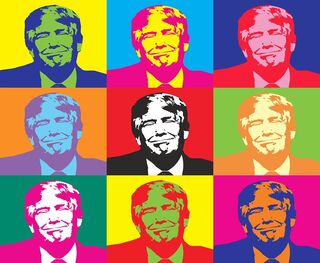Personality
An Egoist and a Politician
The 45th president’s behavior shows two suboptimal modes of self-perception.
Posted January 20, 2021 Reviewed by Lybi Ma
According to Richard Robins and Oliver John (1997), personality psychologists routinely invoke one of four modes or “metaphors” of self-perception when trying to understand individual differences in behavior:
- The Scientist (motivated to seek the most accurate information available about oneself)
- The Consistency Seeker (motivated to seek information that fits pre-existing conceptions about oneself, whether accurate or not)
- The Egoist (motivated to seek the most flattering information available about oneself, whether accurate or not);
- The Politician (motivated to seek approval from other persons, whether based on accurate or inaccurate information about oneself).

Looking back on Donald Trump’s four years as President of the United States, I believe that Trump’s egoistic tendencies were clearly on display, long before he entered that role (e.g., Gaines, 2016); yet I had not anticipated the extent to which Trump would be as much of a Politician as he was an Egoist. Trump’s inclination to use rallies as opportunities to bask in his followers’ unquestioning adoration (not to mention opportunities to share false conspiracy theories and air never-to-be-resolved personal grievances) became a defining feature of his presidency.
The toxic combination of Trump as the Egoist (which, in principle, could be measured via surveys of narcissism; see Raskin & Hall, 1979) and Trump as the Politician (which, conversely, could be measured by surveys of Machiavellianism; see Christie & Geis, 1970) was on full display during the fateful rally on January 6, 2021 – the date on which Congress conducted the usually routine task of counting states’ already-certified Electoral College votes that resulted in Joe Biden becoming President-Elect.
Unlike any losing presidential candidate in the past, Trump not only lied about the U.S. election of 2020 as unfair and unfree (as he had done for several weeks up to that point) but also prodded his followers to march to the Capitol Building to demand that the results be overturned in his favor (despite his decisive loss). Five people died, and more than 50 people were arrested – and toward what end?
Trump’s ego certainly was coddled (by his followers, if not by most of the U.S. or the rest of the world); and Trump’s approval among his “base” apparently was resilient enough for some intelligence professionals to ask what additional acts of mayhem some of Trump’s followers might perpetrate on January 20, Mr. Biden’s Inauguration Day (though enhanced security efforts in the wake of the events on January 6 seem to have kept such acts in check).
I do not claim that Trump’s entire personality can be reduced to the Egoist and the Politician. However, I do believe that Robins and John (1997) were onto something when they proposed the four modes or metaphors of self-perception that I mentioned at the beginning of this post. I doubt that anyone would confuse Trump with the Scientist (which would require too much candor in admitting his own actions that resulted in losing to Mr. Biden) or the Consistency Seeker (which would require acknowledging that he lost the popular vote in two elections and lost the Electoral College vote during the second election, by the same margin that supposedly had represented a historic landslide against Hillary Clinton in 2016).
The only qualification that I would make concerning Robins and John’s proposal is that it could be (mis)construed as suggesting that any particular individual displays only Egoist tendencies, only Politician tendencies, and so forth. By the same token, Robins and John highlighted two of the three “Dark Triad” aspects of personality (i.e., narcissism and Machiavellianism) that Delroy Paulhus and Kevin Williams (2002) subsequently identified (the third of which, psychopathy, does not fit neatly within Robins and John’s framework). In closing, I conclude that the Age of Trump illustrates the potential dangers of the Egoist/Politician mix.
References
Christie, R., & Geis, F. L. (1970). Studies in Machiavellianism. New York: Academic Press.
Gaines, S. O., Jr. (2016). The Trump profile: Narcissistic and predatory? Retrieved October 26, 2016, from https://www.psychologytoday.com/blog/deep-focus/201610/the-trump-profil…
Paulhus, D. L., & Williams, K. M. (2002). The Dark Triad of personality: Narcissism, Machiavellianism and psychopathy. Journal of Research in Personality, 36, 556-563.
Raskin, R., & Hall, C. S. (1979). A narcissistic personality inventory. Psychological Reports, 45, 590.
Robins, R. W., & John, O. P. (1997). The quest for self-insight: Theory and research on accuracy and bias in self-perception. In R. Hogan, J. A. Johnson, & S. R. Briggs (Eds.), Handbook of personality psychology (pp. 649-679). New York: Academic Press.


